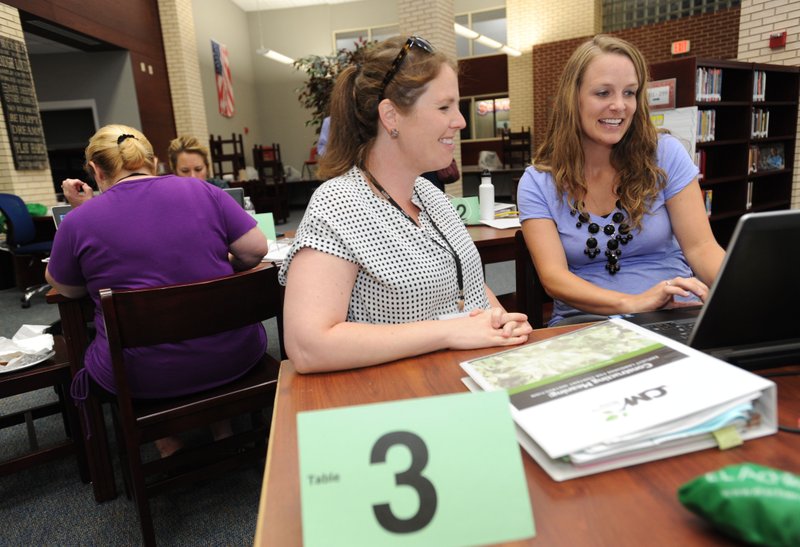SPRINGDALE -- Principals have demonstrated a resolve to serve all students, a focus that has received national attention and provides an example for what's possible in schools across the state, the implementation chairman of the Forward Arkansas initiative said Wednesday.
"You become that shining example," said David Rainey of Dumas, who spoke to a group of Springdale school principals. "If it can happen in Springdale, it can happen in other places across the state."
Forward Arkansas
• Vision: Every student will graduate prepared for success in college and the workplace
• Strategic goal: Becoming a leading state in education by improving student achievement at a historically ambitious yet achievable rate and closing the achievement gap within a generation
• Seven areas of focus: pre-kindergarten, teachers and students, teaching talent, support beyond classrooms, education leaders, schools nearing or in academic distress, systems and policies that support student success
Source: Forward Arkansas
The State Board of Education last month adopted recommendations from the Forward Arkansas initiative for every student to succeed in college and careers and for the state to become a national leader in education.
Forward Arkansas is a partnership involving the Arkansas Department of Education and two philanthropic organizations, the Winthrop Rockefeller Foundation and the Walton Family Foundation.
A 56-page document with short- and long-term goals was developed with guidance from a 28-member steering committee of educators, government leaders, civic leaders and business people. Hugh McDonald, president and chief executive officer of Entergy Arkansas, was the committee chairman.
Rainey is leading the initiative's implementation working group. He and members of his team are visiting with groups and school districts across the state, he said.
Springdale educators contributed to the plan and are involved in its implementation, said Kathy Morledge, an assistant superintendent overseeing the district's elementary schools. Morledge is on the implementation team, which meets about every other week, she said.
Justin Minkel, a teacher at Jones Elementary School in Springdale, is on the steering committee. Morledge, Minkel and Melissa Fink, principal at Jones, were interviewed during the development of the 56-page document.
Rainey attended a monthly meeting of Springdale principals to share the project's vision and seven areas of focus identified to achieve it. He led an informal conversation that gave them an opportunity to share their thoughts and ideas.
"It was a gold mine of activity," Rainey said.
Facing challenges
Schools across the state are struggling to meet the needs of diverse populations of students, Rainey said. Springdale schools have structures to identify the needs of diverse groups of students and to follow up with programs to support students and help them succeed.
"When you have that kind of culture, you're not really daunted by the diversity challenges," Rainey said. "One of the most attractive things about Springdale is they're figuring it out daily. As things come up, they've got the structure in place to do that."
Jones Elementary School was spotlighted by the U.S. Department of Education for its work with children in poverty, Rainey said. The district's efforts to personalize learning led the district to be the only one in Arkansas to receive a federal Race to the Top grant.
The district met all the criteria for establishing its School of Innovation under a law allowing for schools of innovation, Rainey said. The school of eighth- and ninth-graders is growing into an eighth- through 12th-grade campus that has a goal for most students to finish high school with an associate's degree.
"That influence is going to be tremendous across Arkansas," Rainey said. "I think it's going to be the standard for what a school of innovation ought to be. It's dramatically changing the way kids are taught."
Principals' feedback
The discussion Wednesday touched on access to pre-kindergarten, career guidance for students, internships, apprenticeships, parent programs, school-based health clinics, poverty, elective courses and the teaching workforce.
In preparing children for succeeding after high school, elementary schools can work to help young children discover what innate skills and abilities they have, said Regina Stewman, Sonora Elementary School principal.
The Environmental and Spatial Technology, or EAST, program at her school helps students discover their abilities by having them solve problems based on their interests. Components of the EAST program could apply to every classroom, she said.
Justin Swope, Lee Elementary School principal, cautioned Rainey to have some synthesis of solutions so policy changes don't become unfunded mandates increasing workload and discouraging teachers from staying in the profession.
"It can be counterproductive," Swope said.
Areas of focus for Forward Arkansas align with many programs in place in Springdale, including pre-kindergarten and leadership, Morledge said.
The district operates one of the largest public school pre-kindergarten programs in the state, growing from 960 children last school year to 1,224 children this year, Morledge said. A key focus is having a strong connection with families.
Principals, assistant principals and academic and curriculum specialists meet in a leadership academy throughout the school year and are taught with the same curriculum, Morledge said. The meetings provide time for leaders to share ideas and experiences.
Superintendent Jim Rollins focuses attention on academics, asking specific questions about literacy and math and expecting thorough answers with evidence, Morledge said.
"I'm not saying we have all the answers," Morledge said. "We try not to get bogged down. It's worth it. Those are our kids. Every one of them deserves to learn."
NW News on 10/15/2015

